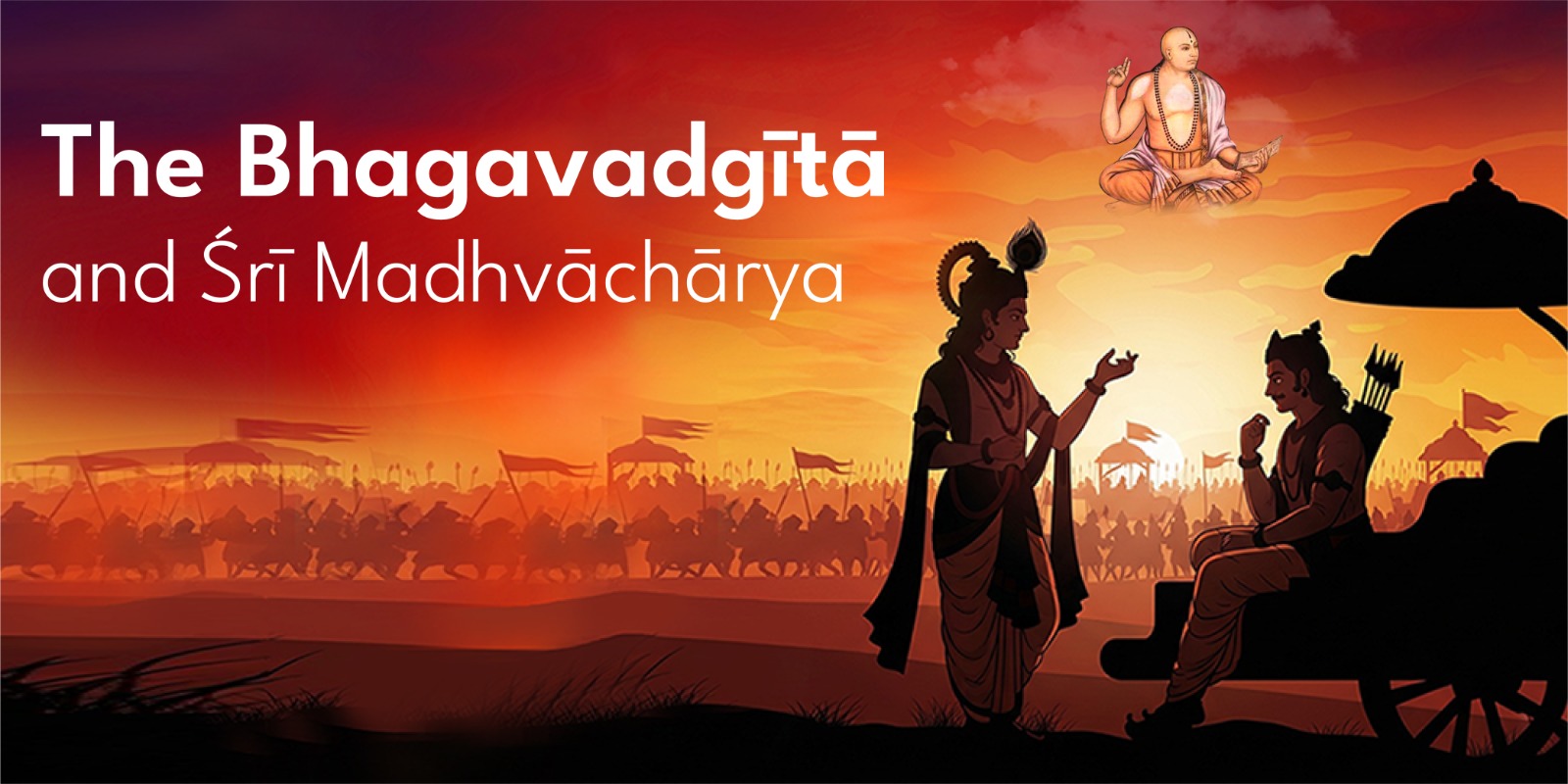
The Bhagavad Gita and Sri Madhvacharya
A textual introduction to Bhagavadgītā through the insights of Śrī Madhvācārya.
Faculty
13 October 2025 - 8 January 2025
6:30 PM-8:00 PM IST
Every Monday and Thursday (Except 20th of October 2025)
Introduction
The Bhagavadgita is arguably one of the most important philosophical treatises ever composed—not only in Indian thought, but in the intellectual heritage of the world. The text, situated in a tricky context of a great warrior caught in an emotional dilemma, deals with timeless aspects of human condition, the nature of reality and the tools of spiritual growth. In the landscape of Indian philosophy, The Bhagavadgita occupies a central place, inspiring hundreds of commentaries across multiple schools of thought over centuries.
This course introduces the Bhagavadgita through the lens of Śrī Madhvācārya, the founder of Tattvavada School of Vedanta, commonly known as Dvaita Vedanta tradition. Śrī Madhvācārya composed two complementary works on the Bhagavadgita —Gītā Bhāṣya and Gītā Tātparya-nirṇaya. The first text focuses on the direct, textual meaning of verses while the second offers a conceptual and analytical synthesis of the text’s message.
Across these works, Śrī Madhvācārya addresses several key interpretive challenges:
- Demonstrating the structural flow—how verses, sections, and chapters interconnect to form a continuous philosophical narrative
- Clarifying verses that otherwise seem redundant by uncovering nuanced layers of meaning
- Reconciling verses that appear to convey contradictory messages, revealing the Gita’s coherent and unified vision
- Establishing interpretations based on strong internal evidence—textual, logical, and commonsense—so they represent the authentic meaning of the Gita rather than a subjective reading
In this course, we will explore each chapter of the Gita through the insights and frameworks provided by Śrī Madhvācārya. We look at chapter summaries, study select important verses, and understand Madhva’s unique contributions in resolving philosophical challenges, fixing precise meanings, and revealing the deep coherence of the Gita’s teaching.
Course Objectives
- Disseminate a chapter-wise understanding of the Bhagavadgita highlighting key verses, and important themes
- Enable the seeker to acquire conceptual clarity on the Gita’s major themes as interpreted by Śrī Madhvācārya
- Familiarize seekers with Śrī Madhvācārya’s methods for resolving interpretive challenges ensuring consistency (ekavākyatā) across the Vedic corpus
Course Outcomes
- Appreciate the structure and flow of each chapter of the Gita with reference to key verses and themes
- Acquire the understanding of key philosophical ideas embedded in the Gita with reference to Śrī Madhvācārya’s elaborations
- Apply the idea of consistency to integrate multiple verses and themes into a coherent philosophical vision
Course Syllabus
The course is organized into four thematic modules:
Module 1 — Context and Foundations (2 sessions)
- Situating the Bhagavadgita within the Mahābhārata.
- Significance of the Mahābhārata as a whole for understanding the Gita.
- Overview of the Gita’s structure and purpose.
- Study of Chapter 1 and part of Chapter 2: setting of the context
Module 2 — The Path of Yoga: Means of Spiritual Practice (6 sessions)
- Chapters 2 (remainder) through 6.
- Nature of jñāna-yoga, karma-yoga, and dhyāna-yoga.
- Interrelationship between these yogas—their relative role in one’s spiritual journey and how they support each other
Module 3 — The Nature and Glory of the Lord (6 sessions)
- Chapters 7–12.
- The relationship between Īśvara, jīva, and prakṛti.
- Worship of the Lord in different forms and contexts, with special reference to the ideas of vibhūti-rūpa (Lord’s manifestations in the world), and the viśvarūpa (cosmic form).
- Establishing the Lord’s supremacy as distinct from the realities of jīva and prakṛti.
- Nature and Significance of Bhakti
Module 4 — Classification, Synthesis and Conclusion (6 sessions)
- Chapters 13–18.
- The guṇa-traya-informed categorisation of reality and human mind
- Prescriptions for what is beneficial versus harmful in spiritual life
- Revisiting and reinforcing key ideas from the first twelve chapters
- Summarizing and synthesizing the Gita’s overall teachings
Reading List
- The Bhagavadgita translated by Dr C H Srinivasa Murthy, published by Poornaprajna Samshodhana Mandiram and Aitareya Shodha Prakashana Peetha, Bangalore
Course Features
Live Interactive Sessions
Engage in real-time lectures with faculty and participate in live Q&A discussionsFlexible Learning
Access recorded sessions and course materials anytime, at your convenienceCertificate of Completion
Receive a certificate upon successful completion of course requirements

